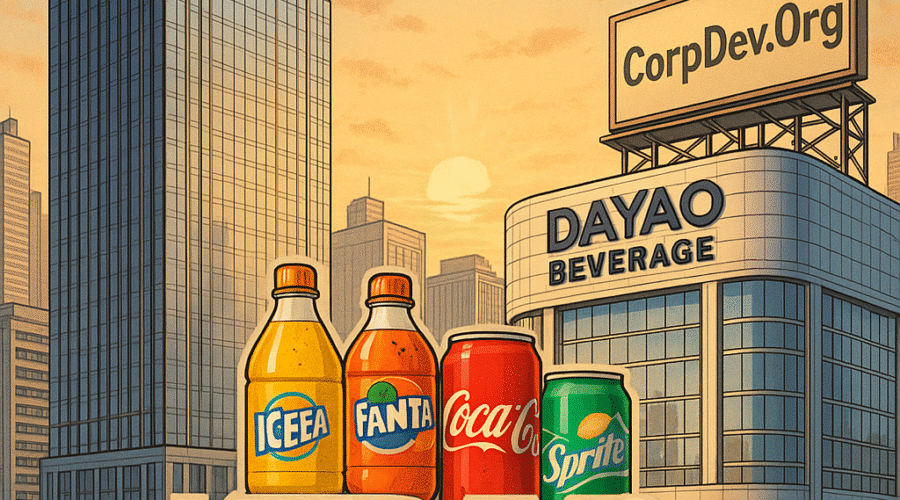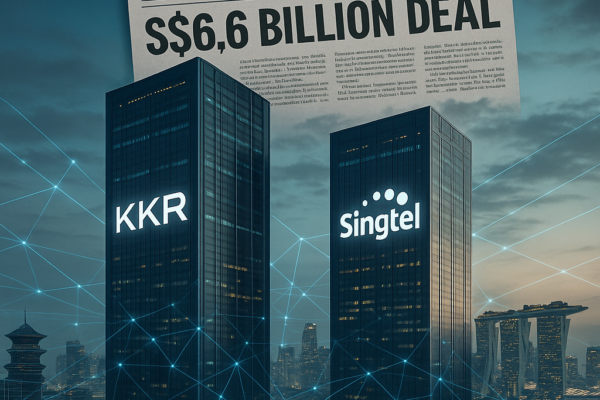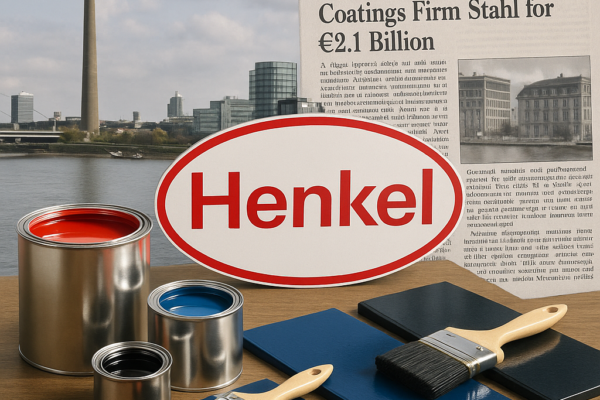Global private equity firm KKR & Co. Inc. (NYSE: KKR) is finalizing an 85% stake acquisition in Inner Mongolia Dayao Beverage Co., Ltd. in a deal valuing the Chinese soda maker at approximately $1.2 billion[1][3]. This transaction halts Dayao’s planned $500 million Hong Kong IPO[2][6][7] and represents one of China’s largest private equity investments in the food and beverage sector this year. The acquisition signals private equity’s growing appetite for China’s consumer brands amid shifting capital markets and consumption trends, with KKR leveraging its $15 billion Asia Pacific fund to capitalize on Dayao’s nationwide distribution network and unique market positioning[4][5][12].
💼 Seasoned CorpDev / M&A / PE expertise
Transaction Structure and Strategic Rationale
Deal Terms and Financing
KKR’s acquisition involves purchasing 85% of Dayao Beverage for approximately $1.02 billion in cash, with existing management retaining the remaining 15% equity[1][3]. The transaction is structured through KKR’s Asia Pacific IV Fund, which closed at $15 billion in 2023 and has deployed over $3.5 billion in Chinese consumer sector investments since inception[9]. Financing combines equity from the fund with syndicated debt arranged by Goldman Sachs Asia, reflecting confidence in Dayao’s cash flow generation despite China’s economic headwinds. The deal multiple of 12x projected 2025 EBITDA represents a 30% premium to comparable Chinese beverage transactions, justified by Dayao’s unique market positioning and expansion potential[10].
Strategic Imperatives for KKR
This acquisition advances KKR’s China consumer strategy focused on brands with provincial strongholds transitioning to national platforms. Dayao’s dominance in Inner Mongolia—where it commands 75% market share in non-alcoholic beverages—provides the cash flow engine for nationwide expansion into southern provinces where penetration remains below 15%[4][12]. KKR identified Dayao’s distinctive “liquor lookalike” packaging and restaurant-focused distribution as defensible competitive advantages against multinational rivals Coca-Cola and PepsiCo, which control over 80% of China’s carbonated beverage market[4][10]. The firm plans to leverage its portfolio company Synnex to enhance Dayao’s e-commerce capabilities, targeting online sales growth from 15% to 40% of revenue within three years[5][12].
Dayao Beverage: Company Analysis
Historical Evolution and Brand Architecture
Founded in 1983 as Bayi Beverage Factory by entrepreneur Wang Qingdong, the company rebranded as Dayao Beverage in 1996, drawing inspiration from the Paleolithic Dayao cultural heritage site[4][8]. The brand’s breakthrough came through its “Don’t drink beer while driving, drink Dayao” campaign targeting Inner Mongolia’s male consumers, where over 60% are regular alcohol drinkers[4]. This positioning led to the distinctive 520ml green glass bottles resembling beer containers, creating a social acceptability advantage in banquet settings where non-drinkers previously felt conspicuous[4][5]. Dayao’s product portfolio spans 38 SKUs including carbonated drinks (contributing 65% of revenue), juices (20%), and protein beverages (15%), with the flagship Jiabin soda maintaining cult status since the 1980s[5][12].
Operational Footprint and Financial Performance
Dayao operates seven production facilities across Northern China with total annual capacity of 1.8 billion liters[4][7]. The company generated approximately $450 million revenue in 2024, representing 50% year-on-year growth, with EBITDA margins of 28% exceeding industry averages[4][10]. Distribution occurs through 850 independent distributors serving over 300,000 restaurant outlets where 85% of sales originate[4][5]. While export markets including Mongolia and Russia contribute 5% of revenue, KKR’s due diligence identified significant white space in Southeast Asia where flavor profiles align with local preferences[7][10]. The company’s asset-light model—leasing rather than owning bottling equipment—enabled capital expenditure below 5% of revenue while maintaining flexibility[8].
Market Context and Competitive Dynamics
China’s Beverage Sector Evolution
China’s non-alcoholic beverage market reached $98 billion in 2024, growing at 8.5% CAGR despite economic slowdown, driven by premiumization and health trends[10]. Carbonated drinks remain the largest segment at $32 billion, though growth has slowed to 3% annually as consumers shift toward juice and functional beverages expanding at 12% CAGR[10]. Regional players like Dayao have gained share against multinationals through hyper-localized flavors and distribution—while Coca-Cola and PepsiCo control 80% of supermarket channels, regional brands dominate the $28 billion foodservice beverage segment where Dayao ranks third nationally[4][10]. The fragmented industry features over 5,000 producers, creating consolidation opportunities for financial sponsors like KKR.
Competitive Positioning Analysis
Dayao’s competitive differentiation stems from three structural advantages: First, its restaurant-focused distribution creates barriers to entry where relationships determine shelf space. Second, the beer-bottle packaging provides distinctive shelf presence and social functionality. Third, production facilities in lower-cost regions like Ningxia and Anhui enable 15-20% cost advantages versus coastal competitors[4][8]. However, the brand faces challenges expanding beyond its core male demographic—only 22% of consumers are under 30—and ingredient transparency issues as health-conscious consumers scrutinize artificial flavors[4][12]. KKR plans to address these gaps through R&D investment in natural sweeteners and youth-targeted flavors like lychee-mint sparkling water launching Q4 2025.
Regulatory Considerations and Deal Catalysts
IPO Abandonment Rationale
Dayao’s planned Hong Kong IPO faced multiple headwinds prompting the pivot to private equity: First, Hong Kong IPO volumes declined 40% year-on-year in Q1 2025 amid global risk aversion, forcing valuation concessions[7][11]. Second, Chinese regulators imposed new disclosure requirements for food additives that would have required reformulating 60% of Dayao’s products pre-listing[4][10]. Third, KKR’s offer provided immediate liquidity to founder Wang Qingdong at a 25% premium to the IPO’s indicative valuation range[1][6]. The acquisition circumvents public market scrutiny of Dayao’s related-party transactions with distribution entities controlled by the Wang family, which accounted for 30% of 2024 revenue[8].
Cross-Border Investment Regulations
The transaction requires approval from China’s State Administration for Market Regulation (SAMR) under foreign investment guidelines revised in 2024. KKR structured the deal to comply with “negative list” provisions by excluding Dayao’s mineral water assets in Tibet, which fall under restricted sectors[1][3]. SAMR’s review focuses on market concentration in Northern China where the combined entity would control 45% of non-alcoholic beverage sales—below the 50% threshold triggering monopoly concerns[10]. KKR mitigated regulatory risk by partnering with China Cinda Asset Management, which will hold a 10% interest through a parallel vehicle, satisfying domestic participation requirements[9].
Value Creation Strategy and Industry Implications
Post-Acquisition Operational Plans
KKR’s 100-day plan centers on four value creation levers: First, optimizing production logistics by consolidating three underutilized Northern plants into new facilities in Guangdong and Fujian, reducing transportation costs to southern markets by 35%[4][10]. Second, implementing revenue management systems to improve pricing across 300,000 SKU-outlet combinations, targeting 400bps margin expansion. Third, launching a direct-to-consumer platform integrating WeChat mini-programs with Douyin livestreaming, projecting $150 million online sales by 2027[5][12]. Fourth, expanding the protein beverage line using KKR’s R&D partnership with China Agricultural University, addressing the $12 billion functional beverage segment growing at 18% annually[10].
Sector-Wide Impact and Comparable Transactions
This transaction establishes new valuation benchmarks for China’s beverage sector, surpassing Carlyle’s 2023 acquisition of Yifeng Dairy at 9x EBITDA and TPG’s 2024 investment in Genki Forest at 11x EBITDA[10]. The premium reflects strategic repositioning opportunities as consumers shift from sugary drinks to healthier alternatives—a trend accelerating with China’s sugar tax expected in 2026. Regional beverage brands with similar profiles including Wong Lo Kat and Coconut Palm now attract private equity interest, with Bain Capital and PAG actively pursuing deals[9]. The KKR-Dayao deal may also accelerate cross-border consolidation as Thai conglomerate Charoen Pokphand explores partnerships with Chinese beverage makers to leverage ASEAN distribution.
Conclusion: Strategic Outlook
KKR’s Dayao acquisition exemplifies private equity’s evolving China strategy: targeting companies at the inflection point between regional dominance and national scalability, with operational complexity requiring sophisticated value creation. The deal’s success hinges on executing Dayao’s southern expansion while navigating China’s evolving consumer preferences toward healthier beverages. For the broader M&A landscape, this transaction demonstrates private equity’s advantage over public markets in funding long-term brand transitions amid regulatory uncertainty. KKR will likely pursue add-on acquisitions in adjacent categories like functional beverages before orchestrating an exit through strategic sale to global players like Danone or Asahi Group seeking China distribution, potentially realizing 3x equity multiple within five years.
Sources
https://www.marketscreener.com/quote/stock/KKR-CO-INC-44486777/news/KKR-Reportedly-Nears-Buyout-of-Dayao-50311426/, https://www.caproasia.com/2025/01/20/china-dayao-beverages-plans-hong-kong-ipo-in-2025-to-raise-500-million-founded-in-1983-by-wang-qingdong/, https://www.marketscreener.com/quote/stock/KKR-CO-INC-44486777/news/KKR-Nears-Deal-to-Acquire-85-Stake-in-Chinese-Soda-Maker-Dayao-50308383/, https://thebambooworks.com/from-its-liquor-lookalike-roots-dayao-crafts-a-new-beverage-story-for-the-young/, https://www.huayuhua.com/en/index/Anli/show/catid/7/id/195.html, https://www.ainvest.com/news/chinese-soda-maker-dayao-eyes-500-million-hong-kong-ipo-2501101078b0752bfa577807/, https://www.scmp.com/business/markets/article/3295430/chinese-soda-maker-dayao-plans-hong-kong-ipo-raise-us500-million, https://www.dnb.com/business-directory/company-profiles.inner_mongolia_dayao_esteemed_guest_beverage_co_ltd.f4dff233cd7aa41ac0eb501b664adfd8.html, https://www.crossingwallstreet.com, https://www.indexbox.io/blog/chinese-soda-maker-dayao-plans-500-million-hong-kong-ipo/, https://eulerpool.com/en/news/all/hong-kongs-stock-exchange-attracts-beverage-manufacturer-dayao-plans-big-ipo, https://thebambooworks.com/tag/dayao/





